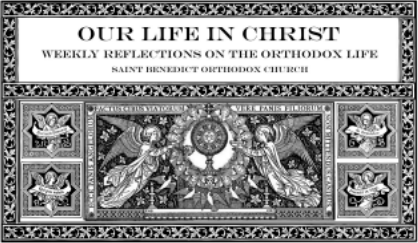Reflections on Prayer
“Those who have truly decided to serve the Lord God should practice
the remembrance of God and uninterrupted prayer to Jesus Christ,
mentally saying: Lord Jesus Christ, Son of God, have mercy on me, a
sinner.” ~ St. Seraphim of Sarov
Reflections on the Sacrament of Confession
“[Regarding confession] some flee from this work as being an
exposure of themselves, or they put it off from day to day. I presume
they are more mindful of modesty than of salvation, like those who
contract a disease in the more shameful parts of the body and shun
making themselves known to the physicians; and thus they perish
along with their own bashfulness” ~ Tertullian
We Work Out Our Salvation in Community
Salvation is primarily worked out in our relationships with
others. Our interaction with our spouse, children, fellow
parishioners, boss, co-workers, waitresses, and each and every
person we encounter in the day — this is where we fine tune our
soul. In every scenario, our task is straightforward: to cultivate
love and assuage anger.
What is Christian Love
Love is a devotion to inspiring virtue — the aim to elevate souls
towards God.
“For Abba Joseph, real Christian love is nothing more and
nothing less than that which arises from a devotion to virtue
shared between two friends…Real love is the yoke that brings
together two people onto a single path if and when that path is
purity of heart, and its destination the Kingdom of God”
(Opperwall 57).
Six Foundations for Nurturing Friendship
- As taught by Abba Joseph
1) Detachment with regard to earthly possessions
2) Not considering oneself wise, but deferring to the point of
view of the other
3) Seeking love and peace above all
4) Refraining from anger at all times
5) Calming the anger of the friend should it arise
Quenching Anger By All Means
Abba Joseph: “For nothing is greater than love, and, conversely,
nothing is worse than fury and anger. Indeed, anything — no
matter how useful and necessary it seems — ought to be left
aside, if doing this will avoid riling up anger” (59).
Loving – When Wronged
Abba Joseph: “First, a monk who has been struck by any kind of
injustice ought to maintain his tranquility — not just that of his
lips, but that of his heart — to the very depths…Instead, he
should recall the gift of his former love, and picture in his mind
the renewal of peace” (59).
Converting Anger into Love
“Anger that is met with discretion becomes a spur of love, and
thus a tool in the pursuit of purity of heart” (61).
We Are Responsible to Attempt to Assuage Anger in Others
“Abba Joseph…demands that every person be responsible also for
the anger of other people…[Christians] must put their all into
trying to assuage the anger of anyone who might be offended at
them.”
Every Offense is an Opportunity for Mercy
“We must react to every opportunity to offer mercy to another
human being with an outpouring of love” (68).
Co-suffering
Compassion: Latin roots — co-suffering
“It is a decision on the part of a person to suffer along with
someone suffering” (69).
When judging others, we must recognize that we too share the
same sin in our hearts. We struggle, and are little different than
others who struggle. Oftentimes, our innocence in matters has
less to do with our purity than with our circumstances. We must
look at others, in their sin, with profound compassion.
* The lack of temptation is a sign of a lack of spiritual progress
Abba Chaeremon: “A person who, by such love, draws near to
the image and likeness of God, will rejoice in the good because
of the joy of the good itself. Possessing the same feeling of
patience and gentleness, he will not be angered by the faults of
sinners, but rather, sympathizing and co-suffering with their
infirmities, he will ask for mercy on them” (74).
The Litmus Test
“For Abba Chaeremon, the degree to which a person is able to
exhibit compassion is like a litmus test of the state of her own
soul.”
How do we react to sin? “Do we abhor it and cover our eyes?…
DO we sit in judgment?…Do we look at them with genuine
compassion, as though we are looking in a mirror at our own
sins…Holy people will always co-suffer with those around them,
while, ironically, those who are still in their own sins will sit in
judgment” (78).
Opportunities for Transformation
“Life in society is a string of moments inviting compassion. To
seize even one or two of these moments a day would effect a
spiritual transformation in us that we could scarcely imagine”
(77).

